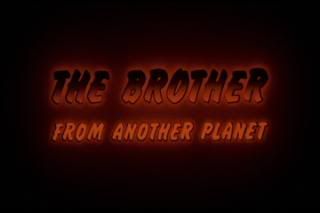
Aliens show up on Earth all the time, looking like you or me. The alien might be Jeff Bridges (Starman), David Bowie (The Man Who Fell To Earth), or one of the actors who, over the years, has fallen victim to the pod people (Donald Sutherland being my favourite of the bunch). Filmgoers are used to the idea. John Sayles may very well have asked himself: “How come all these aliens are inevitably white dudes?” Good question. The Brother From Another Planet simply changes the skin color of its alien invader, and in doing so turns this little subgenre of SF film on its head.
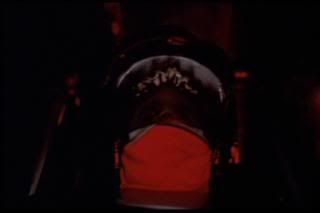
The film begins with the Brother (Joe Morton) having some problems with his low-tech spacecraft, the type you’d expect to see in a low budget 80s film. The Brother is forced to crash-land on Earth, and in no time finds himself in Harlem--specifically, at a bar owned by Odell (Steve James) and populated by a group of regulars who, while intrigued by the Brother, seem willing to accept him. The Brother cannot speak, but he understands. With a simple laying-on of hands, he can heal a wound or fix an arcade game. It turns out that he’s a slave, and that he ended up on Earth while avoiding capture by two Men in Black (John Sayles himself and David Strathairn), and that the reason for his slavery has nothing to do with his skin, but with the three big toes on his feet.
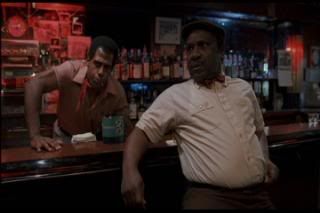
In literature, at least, there’s a long history of science fiction being used as a critical genre. Authors use the accoutrements of the genre to form social criticisms, or to give philosophical or theoretical concepts a physical (literal) shape. This is to say that the genre allows the reader to look at something normal in a new way, thus making it the genre of cognitive estrangement, for you grad school types. Unfortunately, this critical aspect of science fiction rarely translates into film. SF films are, inevitably, action or horror films with SF trappings--cool aliens, advanced weapons, great FX, but not so big on the critical or cognitive aspect of things. Not that I’m complaining--Aliens, for example, is one of my favourite films of all time. It’s just that there’s so much more that can be done.
Leave it to John Sayles to make such a film. The Brother From Another Planet manages to engage in a sort of cultural criticism, and because of its SF nature it manages to do it in a different way, while also remaining light-hearted and humorous. It works on a lot of levels. For one, the fact that the people of Odell’s bar choose to refer to the alien as “the Brother” points to a degree of social connection and identification that would be entirely lacking were the alien a white man who’d ended up anywhere else in the US. The people in Odell’s bar help the Brother because he is a brother.
It also becomes quite clear that they’re all brothers from another planet, and that that planet is Harlem. In one of the film’s better scenes, a street performer sits beside the Brother on the subway and shows him an elaborate card trick. He follows it up with an incredibly feat: on the last stop before entering Harlem, he makes all of the white people disappear. The SF nature of the film allows Sayles to tackle these cultural issues without, in most cases, seeming preachy.
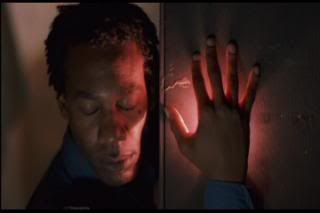
One thing that this review, up to this point, might not have gotten across, is the fact that The Brother From Another Planet is a funny film. In fact, it’s at its strongest when it’s at its funniest, and falters when it focuses too much Sayles’ social message and ignores humour in the process. Sayles and Strathairn are hilarious as the Men in Black; their alien-ness shows through in their awkward posture, their odd walk, and (more obviously) in the fact that they shriek like injured cats when excited. Their interaction with the regulars in Odell’s bar (and later, their fight with the same people) is a fantastic bit of comedy. But Sayles and Strathairn aren’t the only ones who have a solid outing; Joe Morton, as the silent Brother, shows a great range of subtlety and depth in his performance, even though (or because), as a mute, he has to rely on facial expressions to get his character across to the audience.
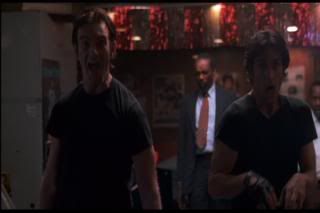
The film’s not entirely a success, though. In the second half of the film the Brother gets involved with an aging R&B singer (which is just dull and sort of extraneous), and also confronts a drug-dealer face on, which is heavy-handed and a little unnecessary. It’s obvious, from watching most of John Sayles’ films, that he wants to engage with social realities head-on, but when he steps out of the context of the film to do so--or, more accurately, bends the narrative of the film to make it fit--the movie as a whole suffers. Sayles’ heart is in the right place, but here, as in some of his other films, he tries too hard to hammer the point home. These scenes aren’t funny, and in a comedy, well, that’s just never a good sign.
The MGM DVD of The Brother From Another Planet is a fairly run-of-the-mill offering. It comes with a commentary by Sayles, and a featurette with Sayles and Maggie Renzie, who produced almost all of Sayles’ films. My favourite part of the DVD comes a the start of the feature, where a very serious-looking black and white note states that the film has been maintained by The Anarchists’ Convention Inc. Makes the film seem tough.
Apparently, Anarchists’ Convention has dedicated a lot of time and effort to restoring Sayles’ early films, so I’d encourage anyone who is interested in the director to obtain these films in a nice and legal fashion, so that the right people benefit. The Brother From Another Planet is a great film, despite its few flaws, and it really stands out as an unique offering within American film.










6 comments:
How is the Sayles commentary on the film? I remember seeing some interesting interviews with him around the time that Lone Star came out, and I would imagine that the early to mid 80s would be a particularly interesting time for him.
I think Joe Morton is an incredibly underrated actor, though i'll admit that the role I most associate him with is Miles Dyson in Terminator 2.
Sadly, I just returned the film to the library, and only listened to a few snippets of the commentary. Commentaries aren't something I generally watch (listen to?) unless it's a movie I'm especially fond of, or if I think a scene is especially interesting. Or if Robert Rodriguez does it, cuz dude knows how to do a good commentary.
And yeah, I've had to describe Joe Morton as "the black dude from T2" more than once. Of course, this is generally followed by people replying "There's a black dude in T2?"
I'm a pretty strong proponent of commentaries, but I often just have them on in the background while I do other things.
Strangely enough, the other films I best remember Joe Morton from are also John Sayles films. like Lone Star and City Of Hope. Though, the guy has done a ton of TV work.
Yo Ash knock it off you're making us look bad.
What Hollinger said. Is the black dude from T2 the guy who holds the heavy thing over the bomb trigger?
That's the guy.
Sarah Connor: [narrating] Dyson listened while the Terminator laid it all down: Skynet, Judgment Day, the history of things to come. It's not everyday you hear that you're responsible for 3 billion deaths. He took it pretty well.
Miles Dyson: I feel like I'm gonna throw up.
Post a Comment